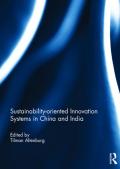
This paper analyses the role of behavioural factors for the energy management of micro and small enterprises (MSEs) in Sub-Sahara Africa for the first time. Drawing on semi-structured interviews and focus group discussions in Uganda, it finds that behavioural barriers impeding energy efficiency contribute to the limited performance of MSEs in Uganda. Limited self-control and short-term thinking, habits, a status quo bias and a lack of trust impede the uptake of energy efficiency, while first-hand experience with efficient technology, implementation intentions and social learning can be conducive. Behavioural insights on energy efficiency therefore present another piece of the puzzle on MSE performance.

Transforming the world economy towards sustainability, while ensuring decent levels of resource use for all global citizens, is the greatest challenge of our time. This book explores how innovation systems need to be adapted to successfully confront these challenges. The first chapter introduces the concept of sustainability-oriented innovation systems which highlights the systematic differences between systems that have developed along current resource-intensive technological trajectories and those that address the impending environmental mega-problems. The subsequent articles present case studies of sustainability-oriented innovations in a number of policy areas, including energy efficiency, electric mobility and generation of renewable energy, in China and India. These case studies confirm the specificities of innovation systems geared towards a green techno-economic paradigm.

There is a growing body of evidence that environmental regulations can support strong economic performance. This report from Sustainable Prosperity finds that environmental regulation comes with lower compliance costs and greater innovation than previously thought.
In 2014, researchers at the OECD constructed the first comprehensive set of data on environmental strictness and found that “an increase in stringency of environmental policies does not harm productivity growth.” We know this to be true for specific policies as well – the United States SO2 market has led to a greater than expected emissions reduction, at less than half the predicted compliance costs. The same good news story has been seen in Canada – The introduction of British Columbia’s carbon price coincided with a 16% decrease in overall fuel use in its first 5 years, at the same time that the province’s economy grew slightly more quickly than the rest of Canada’s.
Laboratory studies suggest that improved cooking stoves can reduce indoor air pollution, improve health, and decrease greenhouse gas emissions in developing countries. The authors provide evidence, from a large-scale randomized trial in India, on the benefits of a common, laboratory-validated stove with a four-year follow-up. While smoke inhalation initially falls, this effect disappears by year two. They find no changes across health outcomes or greenhouse gas emissions. Households used the stoves irregularly and inappropriately, failed to maintain them, and usage declined over time. This study underscores the need to test environmental technologies in real-world settings where behavior may undermine potential impacts.
The policy summary for this paper is available here.
Biomass combustion with traditional cookstoves causes substantial environmental and health harm. Nontraditional cookstove technologies can be efficacious in reducing this adverse impact, but they are adopted and used at puzzlingly low rates. This study analyzes the determinants of low demand for nontraditional cookstoves in rural Bangladesh by using both stated preference (from a nationally representative survey of rural women) and revealed preference (assessed by conducting a cluster-randomized trial of cookstove prices) approaches. The authors find consistent evidence across both analyses suggesting that the women in rural Bangladesh do not perceive indoor air pollution as a significant health hazard, prioritize other basic developmental needs over nontraditional cookstoves, and overwhelmingly rely on a free traditional cookstove technology and are therefore not willing to pay much for a new nontraditional cookstove.
